India-Brazil Strategic Partnership and Vision, Setting Pace for a Multipolar World
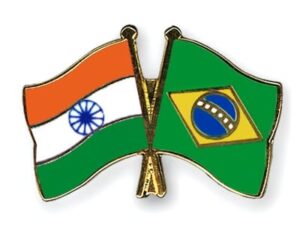
A change of guard will take place in Brazil soon. Brazil will get a new President, Luiz Inacio Lula da Silva, who is taking over the reins of the country’s administration from January 2023. President Lula da Silva comes from an ex-trade unionist background and is respected as a seasoned politician. Incoming President Lula is expected to give Indo-Brazilian joint efforts new momentum in global affairs.
Brazil’s connection with India was established shortly after independence from British rule. Brazil was the first South American country to establish diplomatic relations with India in 1948, and it has strengthened over the years.
The relationship between the two countries was later elevated to a strategic partnership in 2006, and that chapter was the beginning of a new fruitful phase. With like-minded perspectives and thoughts, both nations have shared a close relationship at the bilateral level and partner countries in forums like BRICS, G-20, G-4, IBSA, International Solar Alliance and global bodies like the U.N., WTO, and UNESCO.
The Indo-Brazil bilateral partnership is based on a shared global vision, democratic values, and a commitment to bolster economic growth for the welfare of the people in both countries.
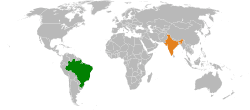
The importance of Brazil with India was no better depicted when Brazilian President was invited as a guest in chief for the Republic Day celebration in 2020.
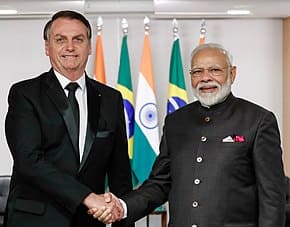
Image Courtesy : Creative Commons
Brazil’s foreign policy of reciprocal multilateralism falls very much in line with India’s policy of strategic autonomy.
A review of the bilateral economic trade cooperation in the last decade highlights dividends, economic growth, and enhancing our international standing.
Economy, Trade, and Investment
On the global map, India and Brazil are considered developing economies with a solid presence as a regional power in global geopolitics. India belongs to a low, middle-income category, and even with a projected GDP of $ 5 trillion soon, it can barely manage a basic per capita GDP of approx. $3,570, keeping the country within the low-middle-income category in the foreseeable future.
Although Brazil belongs to the upper middle-income category, it has its own challenges. India is the fifth largest trading partner, and the bilateral trade chain exceeded US$ 11 billion, an increase of 63% compared to 2020 and a steady rise from the level observed since 2015.
India’s exports to Brazil include agrochemicals, synthetic yarns, auto parts, pharmaceuticals, and petroleum products. Brazilian export lists to India have crude oil, gold, vegetable oil, sugar, bulk mineral and ores.
Brazilian companies have invested in the Indian automobile, I.T., mining, energy, biofuels, and footwear sectors. Indian companies have invested in I.T., Pharmaceutical, Energy, agri-business, mining, engineering, and automobiles sectors in Brazil.

India’s Sterlite Group had earlier won a power transmission line project worth 800 million, and UPL has already invested US$150 million for its new plants in Sao Paulo. In 2018, the total Indian investment in Brazil was US$ 6 billion, and Brazil in India was around USD 1 billion. (Source MEA report, Government of India).
Efficient Trade Regulation and Practices
India and Brazil have already established institutional mechanisms to identify bottlenecks in bilateral trade and take necessary measures to address them. India was a signatory in the Preferential Trade Agreement (PTA) with MERCOSUR (a regional grouping (of Brazil, Argentina, Uruguay and Paraguay) in 2004.
All parties agreed to expand the India-Mercosur PTA from its list of 450 items as it would unlock the potential and enhance trade ties. The last virtual Summit of MERCOSUR was held on 24 September 2019.
Shared Vision towards a Multipolar World
India and Brazil share a common vision of a multipolar world based on democratic values and the convergence of views on many international subjects. Today the cooperation between the two extends beyond bilateral issues, including active participation in BRICS, IBSA, G-20, and multilateral bodies such as the U.N. and WTO.
Indo-Brazil delegates periodically engage in summit meetings, high-level visits, and exchanges. Trade and investment have been steadily growing, and cooperation is being extended in the domains of bioenergy for sustainable fuel and energy solutions to the global community.
Although, at present, India and Brazil’s bilateral relations are passing through an unpredictable global environment (Ukraine conflicts, post-pandemic, economic crisis), our shared perceptions of multipolarity allow us to explore new avenues for greater cooperation.
Coming together on BRICS
The organisation of Brazil, Russia, India, China, and South Africa or BRICS, aims to promote peace, security, economic development, and cooperation among the member countries for mutual prosperity.

From the first Summit in Moscow in 2010, BRICS has evolved through cooperation in trade, agriculture, infrastructure, small and medium enterprises, energy, finance & banking etc. Today the BRICS occupies a significant position in the global economic order in terms of population (40%), GDP (25% nominal and US$ 16.039 trillion), land coverage (30%), world trade (18%), and global forex (US$ 4 trillion).
During the BRICS Brazil Summit 2014, “The New Development Bank” (NDB) was created with Contingent Reserve Arrangement (CRA), having a far-reaching implication for the future world order in general and BRICS economies.
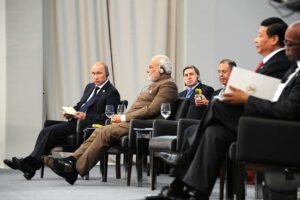
Kremlin.ru, Putin, Modi, Jinping and Zuma at the 2014 BRICS summit, CC BY 4.0
Both initiatives contribute significantly to accelerating economic growth resulting in socio-economic progress in the member countries. In the last five years, NDB has approved 70 plus infrastructure, and sustainable development projects amounting to US$ 25.07 billion and India has 18 such projects amounting to US$ 6.9 billion.
The last BRICS foreign ministers meeting held on 22 September 2022 in New York appreciated the performance of India and Brazil as members of the UNSC. Russia and China also endorsed the significance they attach to the position of Brazil, South Africa, and India in international affairs. (Source Economic Times)
Participation in G 20 Governance
G20, the premier body for global economic coordination, emerged in 1999 as an informal network of finance ministers and governors of countries’ central banks in the prevailing context of the Asian financial crisis.
In 2008, U.S. President George W. Bush invited the G20 heads of state and government to Washington for an emergency summit to tackle the global recession. America realised that the G7 grouping in isolation could no longer manage the global economy on its own and needed the resources and will of emerging economies.
Since then, Brazil’s contribution to G20 governance is also prominent in its vital compliance records (81% compliance score) with the many commitments G20 summits have made. Brazil’s compliance is highest in the areas of energy (+1.00), food and agriculture (+1.00), climate change (+.50) and macroeconomics (+.50). These are the domains where Brazil has strong capabilities to take on the leadership role and strengthen the G20 governance.
Brazil can lead the world on several challenges that will loom large in the global community. The most significant one is energy and climate change. Brazil’s hosting of the historic Rio+20 conference is a significant opportunity to address an imperative global need. Besides that, it has the expertise to guide the world in democratisation and human rights. The world looks up to Brazil for its multiculturalism and domestic financial regulation and confides in its capability of taking accountability in G20 governance.
(Source G 20 Information Centre)
During the COVID-19 crisis and post-pandemic period, the global community has become increasingly dependent on digital technologies. The pandemic only has emphasised the need and priority to accelerate a collective response and implement policies that can help reap the digital economy worldwide.
In 2015, Turkey initiated a conference on Digital Economy where issues like e-commerce, challenges faced by SME businesses, digital skill development, cross-border data flow, data privacy, net neutrality, and tax regimes were brought to the forefront.
The world acknowledges India as a leading player in information technology. With its superior expertise in the domain and talent banks, India is the opinion maker in the tech domain.
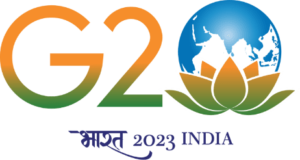
India will chair the future G20 Summit in 2023 and Brazil in 2024. With its proven expertise in the domain, India has an opportunity to play a vital role in developing the long-term agenda for the digital economy. India is already executing its ambitious ‘Digital India’ initiative. The government committed to improving digital inclusion by increasing broadband availability through optimal fibre networks across all village clusters and expanding India’s telecommunications base.
As the next G20 President in 2023, India will identify and develop international support for high-priority areas in social and economic sectors, like energy, agriculture, trade, digital economy, health and environment employment, tourism, anti-corruption, and women’s empowerment. (Source: The Economic Times)
Active Partner Country in G4
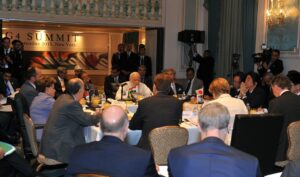
Courtesy https://www.flickr.com/photos/meaindia/21704642086
The G4 group, comprised of Brazil, Germany, India, and Japan, aims for G4 nations to support each other’s bid for a permanent seat in the UNSC. G4 countries feel that reform of the UNSC will extend more effectiveness of the organisation in the current global geopolitical context.
The foreign ministers of the G4 countries (Minister of External Affairs S. Jaishankar, Foreign Minister of Brazil Carlos Alberto Franco Franca, Federal Foreign Minister of Germany Heiko Maas and Minister for Foreign Affairs of Japan Motegi Toshimitsu) recently met on the sidelines during the 76th session of the United Nations General Assembly in New York. They re-emphasised the urgency of reforming the U.N. Security Council, making it more legitimate, effective, and representative by reflecting the reality of our contemporary world.
The G4 ministers also pledged their support to the Common African Position (CAP) as enshrined in the Ezulwini Consensus and the Sirte Declaration. The Consensus underscores Africa’s goal to be fully represented in all decision-making organs of the U.N., particularly the Security Council. (Source: Manorama Year Book)
IBSA – Indo Brazil and South African partnership for South-South Cooperation
The establishment of the three-nation (Indo-Brazil and South Africa) or IBSA was formalised by the Brasilia Declaration of 6 June 2003. IBSA is the official forum that has bought India, Brazil, and South Africa together.
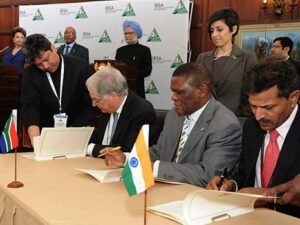
Image Courtesy: https://www.flickr.com/photos/governmentza/8364710018
The three large democracies and significant economies face similar challenges, including India, Brazil and South Africa’s democratic credentials, their condition as developing nations and their capacity to act on a global scale.
Today, the world recognises IBSA for consultation on global and regional political issues, reforms in the international institutions, WTO/Doha Development Agenda, climate change, global terrorism etc. IBSA fund also helps the developing nation with projects.
The period between 2023-25 is significant as it will place the IBSA partnership for South-South Cooperation at global CenterStage. The partnership can update its 2003 founding goals and plan in the new international context, aligning it with some of the G20 development priorities.
They include building a healthcare system based on equality, a clean energy transition from fossil fuels and reducing global food insecurity. The consecutive Presidencies of the G20 for India, Brazil and South Africa provide a rare opportunity to forge an agenda common to the G20 and IBSA.
Working together in World Trade Organization (WTO)

We are all familiar with WTO- the international organisation dealing with trade rules between member nations. The WTO has multiple roles: it operates the current global system of trade rules, acts as a platform for negotiating trade agreements, and is responsible for settling trade disputes through negotiation between its members. As a governing body, WTO ensures that global trade flows smoothly and freely. Let us look at the significant role and leadership contributed by India and Brazil, the emerging power centres.
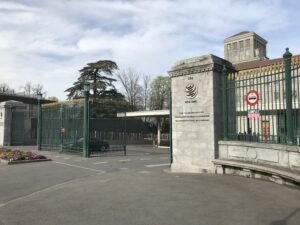
As a member of WTO since 1995 and a General Agreement on Tariffs and Trade (GATT) from 1948, India has played a significant role in the proceedings of the WTO, not only in voicing its own concerns but also as an outspoken advocate of the third world economies.
During the Doha declaration, India inspired 142 member nations. For a new round of trade talks, including environmental, competition, and investment topics. India also gave a clarion call for making the multilateral trading system fairer and more inclusive. The WTO introduced the GATS (General Agreement on Trade in Service), which proved beneficial.
Brazil’s participation in the WTO presents the new vision prevailing in Brasilia for Brazil’s entry into international commerce. Brazil has been a WTO member since 1 January 1995 and GATT since 30 July 1948. Today it offers a favourable treatment of foreign capital entering Brazil and adopts a relatively open commercial regime.
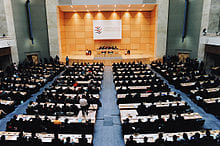
Brazil has always played a constructive role in the WTO, which underlines Brazil’s role in alleviating risks of a food security crisis linked to the conflict in Ukraine and acknowledges the government’s concerns about securing fertilisers. WTO appreciates Brazil’s strong support for multilateralism, with Brazil extending the global trade platform.
UNSC – United Nations Security Council
As defined in the UN Charter, UNSC provides collective security. It authorises the council collectively to investigate any situation threatening world peace. UNSC also recommends procedures for the peaceful resolution of any international conflict; it calls upon member nations to interrupt economic relations and cut off the sea, air, postal, and radio communications entirely or partially to restore global peace efforts.
India is trying to make its way into the big table of permanent members of the UNSC but has yet to be successful so far. India’s active presence in G4 (India, Germany, Japan, Brazil) gives it an edge at becoming one of the permanent members of the UNSC. India has also raised its valid claim to procure a permanent membership based on the following strengths.

Image Courtesy : Youtube
- India is one of the fastest-growing economies in the world.
- India has recently acquired the status of a Nuclear Weapons State.
- India is the second-largest population and the world’s largest democracy.
- India enjoys a high rank in purchasing power parity and is a permanent contributor to U.N. Peacekeeping Missions.
The UNSC has had five permanent members (P5) since its inception. They are Britain, France, Russia, the U.S., and China and a group of ten non-permanent members are chosen turn by turn for a tenure of two years for each, representing the different regions worldwide.
India is currently a non-permanent member; however, Brazil is not. Countries like Brazil, Germany, Japan, and South Africa share a common vision of sitting at the ‘big boy table’ in UNSC and making it more democratic and representative.
Participation of these countries in the security council would be reasonable and a breath of fresh air as it would open a new horizon of hopes and aspirations for the global community. It will certainly make the existing board more wise, pragmatic, and effective in all critical decisions in global security.
Currently, these decision-making powers are limited to veto-wielding privileged permanent members of the Security Council, unable to give an effective direction and generate many optimistic hopes for the larger global community. P5 members like Russia have felt the much-needed changes in UNSC and voiced their support for the permanent membership of India and Brazil in the UNSC. In a tweet on 25 May 2022, the Russian foreign minister Sergey Lavrov expressed that India and Brazil were “more than worthy” candidates for permanent membership in the United Nations Security Council. (source financial express)
Since the beginning of the millennium, the world has observed that emerging economic powers like India and Brazil play a more prominent role in the international economy and politics. But these changes should be reflected in the UNSC and its decision-making. There needs to be some correction in the power imbalance between the P5 and the rest of the world. The UNSC must be more democratic and legitimate in governing and ensuring international peace, security, and order.
India and Brazil – Walking the Common ground together in world affairs
While celebrating 74 years of diplomatic relations in 2022, India and Brazil’s strategic partnership cruises in a fast-changing geopolitical world. Their shared vision of multipolarity provides a brilliant opportunity to explore avenues in world affairs for greater future cooperation. Today both India and Brazil work together in various international forums, including platforms such as BRICS, IBSA, G4, G20, and BASIC, as well as the United Nations in the broader multilateral context and command respect from the global community.
Brazil and India share a common interest in strengthening the WTO and their active participation in global trade recovery and discuss the ongoing stalemate at the WTO. The nations cooperate on multilateral trade issues based on their world views and democratic values.
Both countries are also contributing to U.N. peacekeeping mission operations. Intimate understanding of each other strengths in UNPKO, working relationships and cooperation can help them to leverage strategic defence cooperation in future.
India’s participation as a non-permanent member at the UNSC, and New Delhi’s calls for reforming the UNSC, may lead to deeper Indo-Brazilian cooperation in future. Besides, both of them are active participants in BRICS (focussed on regional autonomy and economic development), G20 (greater economic coordination and cooperation globally), G4 ( Supporting each other for UNSC reforms) and IBSA ( for South-South Cooperation). These are the few common grounds; both nations work together and are respected as emerging global power and voice.
Indo-Brazil Partnership – Prospects under Brazil’s New leadership
President Lula enjoys a special relationship with India and shares India’s vision for South-South cooperation and a multipolar world. He has visited India several times as a state head and part of business delegations.
Lula’s voice will strengthen the neutral and independent position of many developing countries that do not want to take sides with the U.S. or NATO. The ongoing Ukraine-Russia issue has caused many divisions among world leaders. India and Brazil’s leadership are on the same page on the Ukraine war as both advocate peace without taking sides.

Image Courtesy Creative Commons
Under the new leadership of President Lula, Brazil will now restart working with Modi Government at a more incredible pace in the U.N., UNSC, G 4, IBSA, WTO, and other multilateral forums for the more significant interest of the global community.
About the Images Used in the post.
Please note that all images used in the article have creative commons usage rights to provide the readers with engaging editorial content and do not have any commercial value or aspects. The author does not claim ownership of these images at all at any given point in time. For reading more posts on global geopolitics, please click the link.
Exactly.